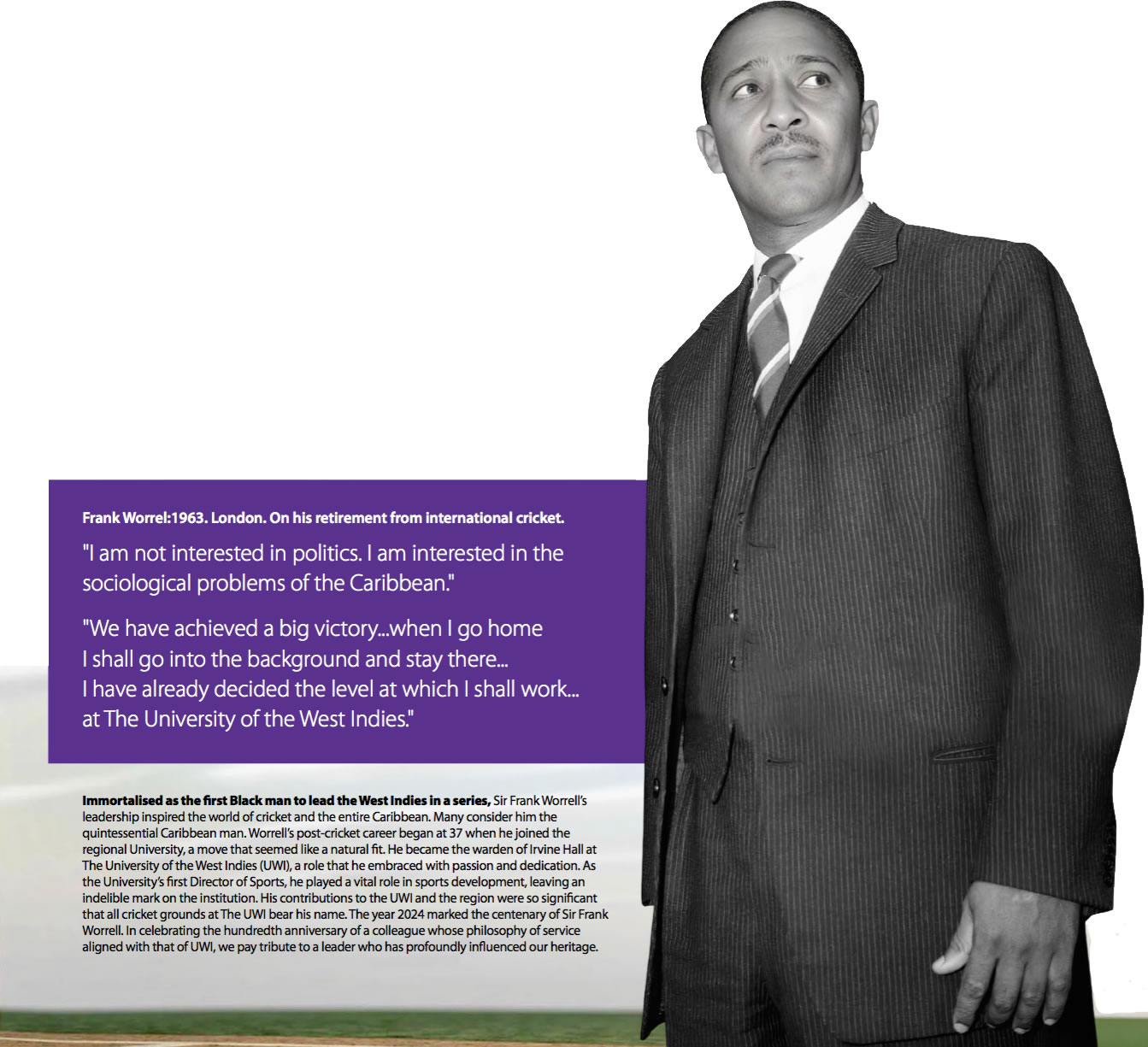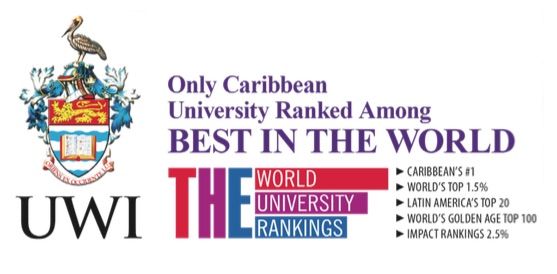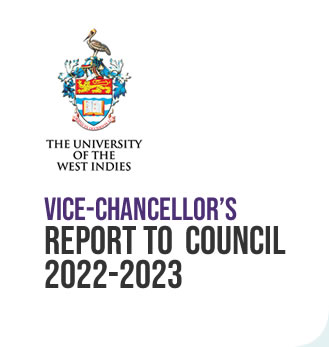Vice-Chancellor's Overview
The UWI: Leading Global Solutions for Sustainable Development

As I reflect on this Annual Report being presented to our stakeholders, our world faces tremendous uncertainties on multiple fronts. We are confronting geopolitical, economic and climate adaptation challenges at the global level. In the Caribbean, we also continue to deal with rising crime and violence, stagnating economies, rising food insecurity, and the ever-present threat of natural disasters which have become more intense as a result of global climate change. However, we cannot withdraw. We must look down the proverbial pitch and gauge how well, as a team, we can combine our skills and strengths to face the headwinds that threaten to obliterate structures with which we have become familiar, even though some of them have not been favourable to our region. It is my firm belief that we have an opportunity to coalesce around a common vision of building even stronger and resilient communities through more effective collaboration within the region and with our global partners. The Report before you shows that The UWI has long been in the vanguard of leading global solutions for sustainable development and how this qualifies us to be considered the world’s leading SDG University.
For more than seventy-five years, The UWI has been unswerving in service to our contributing countries, the wider Caribbean and the world in realisation of our articulated vision of being “An Excellent Global University Rooted in the Caribbean.” Our graduates have gone on to serve across all disciplines, and at all levels across the world. Our academics and researchers teach and continue to work in every area of importance critical to the survival of humanity and our planet. Our students also demonstrate excellence in academics and are encouraged to engage in innovative research under the guidance of their lecturers who are renowned experts in their respective disciplines. The UWI is a community that continues to be focussed on identifying solutions to the myriad challenges facing the societies we serve.
We must look down the proverbial pitch and gauge how well, as a team, we can combine our skills and strengths to face the headwinds that threaten to obliterate structures with which we have become familiar
The UWI has earned its place as the world’s leading Sustainable Development Goals (SDG) University, a recognition that reflects our dedication to not only treating with issues relevant to the Caribbean but to developing global solutions for the challenges faced by humankind. Our work across disciplines, from climate action and health innovation to social justice and economic resilience, continues to shine as a testament to the power of education to transform communities and societies. The UWI has been embedded with regional and international development partners in the quest for sustainable development solutions for many years. Since 2014, the Caribbean node of the UN Sustainable Development Solutions Network was located at The UWI’s Institute for Sustainable Development. In 2019, The UWI was selected by the International Association of Universities to serve as its global leader in the mobilisation of research and advocacy for the achievement of a climate smart world and in 2024, I was invited to serve on the SDSN’s Leadership Council, thereby affording The UWI a voice and a role at the nexus between global science, policy framing and development practice.

It was a natural extension of the work already being done by our researchers and their collaborators in climate change, biodiversity, bio-fuels and alternative energy, governance and other SDG areas, to establish the International School for Development Justice (ISDJ). The ISDJ is located within the Global Campus and will respond to the need to educate future activists within the framework of the SDGs. With support from the United Nations system and significant funding from the Inter-American Development Bank Invest (IDBI), the ISDJ was formally launched in August 2024. Work has been ongoing to begin delivering Master’s level programmes in May 2025. This initiative is an exciting one and involves stakeholders from across the entire UWI system to make it a reality. I have been encouraged by the enthusiasm and the support from the community including our external stakeholders.
Our continued presence among the top global universities in the prestigious Times Higher Education (THE) rankings is a further endorsement of the outstanding quality of teaching, research, and community service that The UWI provides. The Triple “A” Strategic Plan has been a framework for the realisation of our articulated objective to always be in the top 5% of globally ranked universities. This year, we solidified our position among the top 3.5% of universities globally, a reflection of our relentless pursuit of excellence in all spheres. The recognition by THE also underscores our growing international influence, demonstrating that UWI’s impact reaches far beyond the Caribbean, making a meaningful contribution to the global academic and research landscape.
At the core of that success is the strength of The UWI’s global partnerships. These collaborations, ranging from academic alliances to impactful research initiatives with world-renowned institutions, allow us to extend our reach and create synergies that benefit not only our students and faculty but society at large. Through these partnerships, we are able to bring cutting-edge research and innovation to the forefront, tackle some of the most pressing challenges of our time, and provide our students with unparalleled opportunities to engage with global thought leaders and change-makers. In May 2024, the UWI signed an MOU with the University of Buffalo – part of the SUNY system, to domesticate a long-standing partnership between The UWI and SUNY systems, at that campus. The Centre for Leadership and Sustainable Development will serve as a locus for UWI and SUNY academics and stakeholders to engage in multi-disciplinary research and also houses the SUNY- UWI Global Health Initiative which has been conducting research in response to epidemics of infectious and non- communicable diseases.
The UWI’s commitment to social justice, particularly in the realm of reparatory justice, represents an essential part of the Caribbean’s ongoing journey toward healing and reconciliation. By combining rigorous academic research with activism, UWI has become a critical voice in advocating for reparations and justice for the Caribbean people who continue to bear the burdens of the past. Through its leadership in the Caribbean Reparations Commission, as well as its focus on historical and contemporary issues of inequality, The UWI remains at the forefront of efforts to address the legacies of colonialism and slavery and to build a more just and equitable future for the Caribbean. It was an honour for me to address the United Nations General Assembly in March 2024 on the commemoration of the International Day of Remembrance of the Victims of Slavery and the Transatlantic Slave Trade, to urge that august body to recommit to decolonization and to support the Caribbean’s ongoing quest for reparatory justice.

Beyond academics, The UWI extends its nurturing of students into the realm of sports. Our students have represented their countries on the Olympic and global stage for many years.
In December 2024, UWI alumni Amir Jangoo, BSc in Environmental and Natural Resource Management (St. Augustine) and Jediah Blades, BSc in Management (Cave Hill) who emerged from The UWI’s cricket programmes, made their debuts at the level of the regional West Indies Cricket Team. Jangoo scored an impressive 104 not out in his One-Day International debut against Bangladesh, becoming the second West Indies player to achieve a century on debut. The UWI will continue to nurture such talent into the future across all sporting disciplines as we do in academics. The Faculty of Sport continues to support the development of sports in the region through a range of programmes across the campuses at the undergraduate and graduate levels in areas such as sport management, sport medicine, and sport broadcasting.
Our campuses continued on their entrepreneurial trajectory, demonstrating commitment to what we have dubbed in our second phase of the Triple “A” Strategic Plan, the “Revenue Revolution.” Each campus has engaged in initiatives to contain costs as they have surged ahead to identify funding from external sources for research, while maximising on the use of traditional governmental funding. The St. Augustine Campus has been exemplary in the commercialisation of research with a factory producing branded chocolate “Spirit” based on work done by the Cocoa Research Center; an eco-friendly pesticide “Biophyt” developed by researchers in the Faculty of Food and Agriculture; and a range of sealants developed in the Department of Chemistry, that are being used in the construction industry. St. Augustine will also, after considerable work for the past 6 years, be admitting students into its Global School of Medicine in September 2025. Colleagues at the Cave Hill Campus have also been researching multiple uses of sargassum seaweed and have been successful in producing a biofuel that was launched in September 2024, with work continuing to commercially extract sargassum alginate, which is used in the production of pharmaceuticals and cosmetics. The Mona Campus has also been working on a Global School of Medicine in Western Jamaica, and all campuses have been engaging in continuing professional education programmes. I applaud the Principals and their teams for this entrepreneurial spirit.
As we reflect on the accomplishments and milestones of The University of the West Indies (UWI) over the past year, we are reminded of our unwavering commitment to excellence in higher education and to the advancement of global sustainable development. It is with immense pride that I report to the Council on the continued progress of our institution in advancing the global agenda for sustainability and in fortifying our position as a beacon of knowledge, research, and impact.

Professor Sir Hilary Beckles,
Vice-Chancellor,
The University of the West Indies


